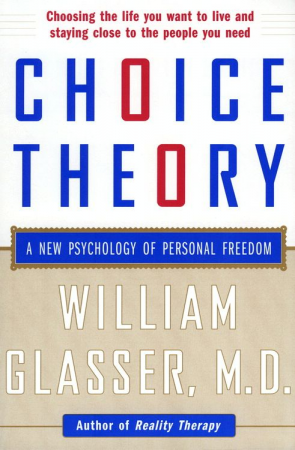Choice Theory by Dr William Glasser.
Choice Theory is an amazing book that delves into the basic drivers of our behaviours and relationships. It tells us some really interesting things about ourselves and those that we try to influence or build relationships with.
There are ten main pillars of Choice Theory. For performance and the workplace, here are the three that really count:
- The only person’s whose behaviour we can control is our own
- All we can give or get from other people is information
- We are driven by five genetic needs all day, every day
If these seem similar to what you hear in my workshops, that is because William Glasser’s work has been a major influence on my research in to motivation and behaviour theories.
Let’s break these down as they have an enormous impact on how we manage ourselves and how we manage others.
- The only person whose behaviour we can control is our own
Managers spend a lot of time trying to control other people. Although we can influence behaviour, we cannot make people do anything. Likewise, no one can make us do anything. All behaviour is a choice (whether or not you like the consequences of your choice is a different story).
Often when we think we have ‘made’ someone do something, all we have really done is change our behaviour to influence theirs. And most time, this inclination to change people’s behaviour against their will is short lived. People will go back to doing what they were originally doing as soon as they are able (read: as soon as their manager leaves).
When we think someone has ‘made’ us do something, the reality is that we chose to do it once we weighed up all the choices, benefits and drawbacks.
The only way we can really influence people’s behaviour is by point 2, below.
- All we can give to, or get from, other people is information
All of our behaviour is a response to information. Your manager just gave you some feedback? That’s information. Someone cut you off in traffic and gave you the bird? That’s information. Just the same as you get information when your phone rings.
With this in mind, no one can ‘make’ us do something in the same way as a ringing phone can’t ‘make’ us answer it. Everything we get is just information, we choose what to do with it.
If we aren’t having the influence on other people’s behaviour that we would like, then all we can do is change the information we give them. That may help, or it may not. The new information we sometimes choose to give people comes in the form of threats or ultimatums, but any change of information might have an effect on behaviours – so we could also try to give positive information and see where we end up.
- We are driven by five genetic needs all day every day
Glasser names these as: Survival, Power, Loving and Belonging, Freedom and Fun. He proposes that the way to get closer to people, build relationships and have some influence is to somehow provide these needs for people. For example, pay them fairly, give them some decision-making power, create belonging, allow people to do work their way and celebrate success.
When we take these things away from people, it ruins our relationships. And if we don’t have a good relationship, then our ability to affect people’s behaviour in a positive way deteriorates.
Glasser’s other observation is that when people have these five needs taken away, they tend to try to get them back somehow. Remove someone’s power and they might exhibit what little power they have by obstructing, avoiding or bullying.
These are three amazing principles to bear in mind when we manage people. The number one lesson in this book was that if we do things to get closer to people, they respond positively to us.
